Unit Four Body
(完整版)pep小学英语全部单词
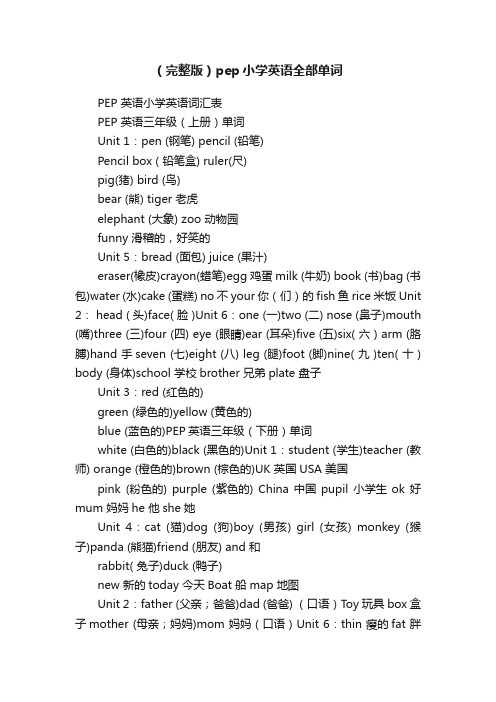
(完整版)pep小学英语全部单词PEP 英语小学英语词汇表PEP 英语三年级(上册)单词Unit 1:pen (钢笔) pencil (铅笔)Pencil box ( 铅笔盒) ruler(尺)pig(猪) bird (鸟)bear (熊) tiger 老虎elephant (大象) zoo 动物园funny 滑稽的,好笑的Unit 5:bread (面包) juice (果汁)eraser(橡皮)crayon(蜡笔)egg 鸡蛋milk (牛奶) book (书)bag (书包)water (水)cake (蛋糕) no 不your 你(们)的fish 鱼rice 米饭Unit 2: head ( 头)face( 脸 )Unit 6:one (一)two (二) nose (鼻子)mouth (嘴)three (三)four (四) eye (眼睛)ear (耳朵)five (五)six( 六 ) arm (胳膊)hand 手seven (七)eight (八) leg (腿)foot (脚)nine( 九 )ten( 十 ) body (身体)school 学校brother 兄弟plate 盘子Unit 3:red (红色的)green (绿色的)yellow (黄色的)blue (蓝色的)PEP英语三年级(下册)单词white (白色的)black (黑色的)Unit 1:student (学生)teacher (教师) orange (橙色的)brown (棕色的)UK 英国USA 美国pink (粉色的) purple (紫色的) China 中国pupil 小学生ok 好mum 妈妈he 他she 她Unit 4:cat (猫)dog (狗)boy (男孩) girl (女孩) monkey (猴子)panda (熊猫)friend (朋友) and 和rabbit( 兔子)duck (鸭子)new 新的today 今天Boat 船map 地图Unit 2:father (父亲;爸爸)dad (爸爸) (口语)T oy 玩具box 盒子mother (母亲;妈妈)mom 妈妈(口语)Unit 6:thin 瘦的fat 胖的man (男人)woman(女人)tall (高的)short (短的;矮的) grandmother (外)祖母grandma (口语)(外)祖母small (小的)big (大的)grandfather(外)祖父grandpa (口语)(外)祖父long (长的)giraffe (长颈鹿) sister (姐妹)brother(兄妹)so 这么,所以children 小孩(复数)family 家庭tail 尾巴Unit 3:eleven (十一)twelve( 十二)thirteen (十三) fourteen (十四)fifteen(十五) sixteen (十六)seventeen (十七) eighteen (十八)nineteen (十九) twenty (二十)kite 风筝beautiful 美丽的Unit 4:apple (苹果) pear ( 梨)orange (橙子) banana (香蕉)watermelon (西瓜) strawberry (草莓)peach (桃) grape (葡萄)buy 买fruit 水果Unit 5:on 在……之上in 在……里面Under 在……之下chair (椅子)desk 课桌cap 帽子Ball 球car 小轿车PEP 四年级(上册)单词词汇表Unit 1: classroom(教室) window(窗户)blackboard(写字板) light(灯,灯管)picture(画,图画) door (门)teacher’s desk(讲台) computer(计算机) wall(墙)fan(扇子,电扇)floor(地板) clean(打扫,清洁,擦干净的)near(在......的旁边) help 帮助really 真的TV 电视Unit 2:schoolbag(书包) math book(数学书)English book(英语书) Chinese book(语文书) story-book(故事书) notebook(笔记本)candy 糖果toy 玩具key 钥匙wow 哇lost 丢失so much 非常的cute 可爱的Unit 3:strong 强壮的friendly 友好的quiet 安静的hair 头发shoe 鞋子glasses 眼镜his 他的or 或者right 正确的hat 帽子her 她的colour( 颜色 )jacket(夹克衫) shirt(衬衫) skirt(裙子)dress(连衣裙) T-shirt(T 恤衫) red(红色的)blue(蓝色的) yellow(黄色的) green(绿色的)white(白色的) no(不;不是) not(不;不是的) Unit 4:bedroom 卧室living room 客厅study 书房kitchen 厨房bathroom 浴室bed 床phone 电话table 桌子sofa 沙发fridge 冰箱find 找到them 他们Unit 5:beef 牛肉chicken 鸡肉noodles 面条soup 汤vegetable 蔬菜chopsticks 筷子bowl 碗fork 叉子knife 刀spoon 勺子dinner 晚餐ready 准备好help yourself 为(自己)取用pass 给,递try 尝试Unit 6:parents 父母cousin 同辈表亲uncle 叔叔aunt 阿姨baby 宝贝doctor 医生cook 厨师driver 司机farmer 农民nurse 护士people 人们but 但是little 小的puppy 小狗football player 足球运动员 job 工作basketball 篮球PEP 四年级(下册)单词词汇表Unit 1:first floor 一楼second floor 二楼teachers ‘office 教师办公室 library 图书馆playground 操场computer 计算机房art room 美术教室music room 音乐教室next to 紧邻homework 作业class 班级forty 四十way 方向Unit2 :breakfast 早餐English class 班级lunch 午餐music class 音乐课PE class 体育课dinner 晚餐get up 起床go to school 去上学go home 回家go to bed 上床睡觉over 结束now 现在o‘clock……点钟kid 小孩thirty 三十hurry up 快点Unit 3:cold 寒冷的cool 凉爽的warm 温暖的hot 热的sunny 阳光的windy 有风的cloudy 有运的snowy 下雪的rainy 有雨的outside 在户外be careful 小心weather 天气New York 纽约how about……怎么样degree 度world 世界London 伦敦Moscow 墨西哥Singapore 新加坡Sydney 悉尼fly 飞,放(风筝)Unit 4:tomato 西红柿potato 土豆Green beans 豆角carrot 胡萝卜horse 马cow 奶牛sheep 羊hen 母鸡these 这些animal 动物those 那些garden 花园farm 农场goat 山羊eat 吃Unit 5:clothes 衣服pants 裤子hat 帽子dress 裙子skirt 女裙coat 外套sweater 毛衣sock 短袜shorts 短裤jacket 夹克shirt 衬衫yours 你们的whose 谁的pack 收拾(行李)wait 等待Unit 6:glove 手套scarf 围巾umbrella 雨伞sunglasses 太阳镜pretty 美观的expensive 昂贵的cheap 便宜的nice 好的try on 试穿size 尺码of course 当然too 太just 正好how much 多少eight 八dollar 美元sale 大减价us 我们的PEP 五年级(上册)单词词汇表Unit 1:old (年老的)young (年轻的)funny (滑稽可笑的)kind (和蔼的、亲切的)strict (严格的)polite 有礼貌的hard-working 辛勤的helpful 有帮助的clever 聪明的shy 害羞的know 知道our 我们的Ms.女士will 将要Sometimes 有时robot 机器人him 他speak 讲finish 完成Unit 2:Monday (星期一)Tuesday (星期二)Wednesday (星期三)Thursday (星期四)Friday (星期五)Saturday (星期六)Sunday (星期天)weekend 周末wash 洗wash my clothes 洗衣服watch TV 看电视do 做do homework 做作业read 读read books 看书play 玩耍play football 踢足球cooking 烹饪often 经常park 公园tired 疲倦的sport 运动play sports 做体育运动should 应该every 每个day 天schedule 工作计划Unit 3:sandwich 三明治salad 沙拉hamburger 汉堡包ice cream 冰淇淋tea 茶fresh 新鲜的healthy 健康的delicious 美味的hot 热的sweet 甜的drink 喝thirsty 口渴的favourite 最喜欢的food 食物dear 亲爱的onion 洋葱Unit 4:sing 唱song 歌曲sing English song 唱英文歌play the pipa 弹琵琶kung fu 功夫dance 跳舞draw 画画cartoon 漫画cook 烹饪swim 游泳play basketball 打篮球speak English 说英语party 聚会next 下一个wonderful 极好的learn 学习any 任何的problem 问题want 想要send 邮寄email 电子邮件at 后接邮件地址I’d like to=I would like toUnit 5:clock 闹钟plant 植物bottle 瓶子water bottle 水瓶bike 自行车photo 相片front 正面in front of 在……正面between 在……中间above 在……上面beside 在……旁边behind 在……后面there 在那里grandparent 祖父母their 他们的house 房子a lot of=lots of 大量flower 鲜花move 搬家dirty 脏的everywhere 处处mouse 老鼠live 住nature 自然界Unit 6:forest(森林)river (河流)lake (湖泊)mountain (山;山脉)hill 山丘tree (树)bridge (桥)building (建筑物)village (乡村;村庄)boating 划船rabbit 兔子high 高的PEP 五年级(下册)单词词汇表Unit 1:do morning exercises(晨练)have ……class(上……课)play sports(进行体育运动)eat dinner(吃晚饭)clean my room 打扫我的房间go for a walk 散步go shopping 购物take 上dancing 跳舞take a dancing class 上舞蹈课when(什么时候)after 在……之后(时间)start 开始usually 通常Spain 西班牙late 晚的a.m.上午p.m.下午why 为什么shop 去买东西work 工作last 上一个的sound 听起来好像also 还,也busy 忙的need 需要play 剧本letter 信live 居住island 岛always 总是cave 洞穴go swimming 去游泳win 获胜Unit 2:spring(春天)summer(夏天)fall/autumn(秋天)winter(冬天)season 季节)picnic 野餐go on a picnic 去野餐pick 摘snowman 雪人which(哪一个)best(最;极)snow 雪good job 做得好because 因为vacation 假期all 完全pink 粉色lovely 可爱的leaf 叶子fall 落下paint 绘画Unit 3:Jan. /January(一月)Feb. /February(二月)Mar. /March(三月)Apr. /April(四月)May(五月)June(六月) July(七月)Aug./August(八月)Sept./September(九月)Oct./October(十月)Nov./November(十一月)Dec./December(十二月)Few 不多,很少 a few 一些Thing 事情meet 集会Sports meet 运动会Easter 复活节Trip 旅行year 年Plant 种植contest 比赛The Great wall national 国家的National day 国庆节American 美国的Thanksgiving 感恩节Christmas 圣诞节Holiday 假期game 游戏Roll 滚动look for 寻找Chocolate 巧克力bunny 兔子RSVP 请赐复by 在……之前Unit 4:first 第一second 第二third 第三fourth 第四fifth 第五twelfth 第十二twentieth 第二十twenty-first 第二十一twenty-second 第二十二thirtieth 第三十special 特别的fool 愚蠢的kitten 小猫diary 日记still 仍然noise 声音fur 皮毛open 开着的walk 行走Unit 5:mine 我的yours 你们的his 他的hers 她的theirs 他们的ours 我们的climb(ing)攀爬eat(ing)吃play(ing)玩jump(ing)跳drink(ing)喝sleep(ing)睡each 每个other 其他each other 相互excited 兴奋的like 像Unit 6:keep 保持keep to the right 靠右keep your desk clean 保持桌面干净talk quietly 小声讲话turn 顺序take turns 按照顺序来bamboo 竹子its 它的show 指引anything 任何事else 另外exhibition 展览say 说have a look 看一看sushi 寿司teach 教sure 当然Canadian 加拿大Spanish 西班牙的PEP 六年级(上册)单词词汇表Unit 1:science 科学museum 博物馆by (经,乘) post office(邮局) bookstore(书店)cinema(电影院) hospital(医院)turn(转弯) right (右边)left(左边) straight(成直线地)crossing 十字路口ask 问sir 先生interesting 有趣的Italian 意大利的restaurant 餐馆Pizza 披萨street 街道Get 到达GPS 全球卫星定位系统Give—gave 给feature 特点Follow 跟着far 较远的Tell 告诉Unit 2:on foot(步行) by(表示方式)乘bus 公交车train(火车)plane (飞机)ship (船;舰)subway (地铁)taxi 出租车slow 慢的slow down 减慢stop 停下Mrs.夫人early 早到的helmet 头盔must 必须wear 穿戴attention 注意pay attention to 注意traffic 交通traffic light 交通信号灯Munich 慕尼黑Germany 德国Alaska 阿拉斯加州sled 雪橇Fast 快的ferry 轮渡Scotland 英格兰Unit 3:visit 拜访film 电影see a film 看电影trip 旅行take a trip 去旅行supermarket 超市evening 晚上tonight 今晚tomorrow 明天next week 下周dictionary 字典comic 滑稽的word 单词comic book 连环画postcard 明信片lesson 课程Space 太空travel 旅行Half 一半price 价格Mid-autumn festival 中秋节together 一起Get together 聚会mooncake 月饼Poem 诗moon 月亮Unit 4:studies 学习puzzle 疑问hiking 远足pen pal 笔友hobby(爱好) jasmine 茉莉idea 想法amazing 令人惊奇的shall 表示征求goal 射门join 加入club 俱乐部share 分享Unit 5:factory 工厂worker(工人)postman 邮递员businessman 商人police officer 警察fisherman 渔民scientist 科学家pilot 飞行员coach 教练country 国家head teacher 校长sea 大海stay 保持university 大学Gym 体育馆if 如果reporter 记者use 使用type 打字quickly 迅速的Secretary 秘书Unit 6:angry 生气的afraid 害怕的sad 难过的worried 担心的happy 高兴的see a doctor 看医生wear 穿more 更多的deep 深的breath 呼吸count 数数take a deep breathcount to ten 数到十chase 追赶mice 老鼠bad 邪恶的hurt 伤害ill 有病的wrong 错的,有毛病的should 应该feel 感到well 健康sit 坐grass 草hear 听到ant 蚂蚁worry 担心stuck 陷住mud 泥pull 拉everyone 每个人PEP 六年级(下册)单词词汇表Unit 1:young—younger 更年轻的old—older 年龄更大的tall—taller 更高的short—shorter 更矮的long—longer 更长的strong—stronger 更强壮的thin—thinner 更瘦的heavy—heavier 更重的big—bigger 更大的small—smaller (体型)更小的dinosaur 恐龙hall 大厅than 与…..相比较,both 两个都kg ( kilogram )千克;公斤countryside 乡村lower 更低的shadow 影子cm ( centimeter ) 厘米smarter 更聪明的become 变成Unit 2:wash—washed 洗clean—cleaned 打扫stay—stayed 停留have—had 有have a cold 感冒sleep—slept 睡read-read 读see—saw 看last 最近的yesterday 昨天before 在……之前drink—drank 喝show 秀magazine 杂志better 更好的faster 更快的hotel 旅行fix—fixed 修理break—broken 破损的lamp 台灯loud 喧闹的enjoy 享受loud 喧闹的enjoy 享受的stay 暂时Unit 3:go—went 走camp 露营went camping 去露营fish 鱼went fishing 去钓鱼ride—rode 骑hurt 伤害eat—ate 吃take—took 拍照take pictures 照相buy—bought 买gift 礼物fall—fell 摔倒off 从……落下labor day 劳动节mule 骡子Turpan 吐鲁番can—could 能till 直到beach 沙滩basket 篮子part 角色lick 舔——licked laugh—laughed 笑Unit 4:dining hall 饭厅grass 草坪gym 体育馆ago 以前cycling 骑自行车ice-skate 滑冰Badminton 羽毛球star 星easy 容易的look up 查阅internet 互联网different 不同的active 活跃的race 赛跑nothing 没什么think—thought 思考feel—felt 感觉cheetah 猎豹trip 绊倒,旅行wake—woke 醒着dream 梦。
【成才之路】人教版英语必修四Unit 4 Section 1

译文:现在世界上多数人见面要握手相互问候,但有些文化(背景的人)会采 取另外一些寒暄方式。比方说,日本人就更愿意鞠躬。
C.people from the same culture may greet each other in different ways
D.body language plays an unimportant part in our life and communication
4.What can we learn from the passage?___B_____
英 语 必 修 ④ 人 教 版
返回导航
·
·
Unit 4 Body language
Ⅱ.短语互译 1.保卫……以免受…… 2.在防守;在保卫 3.相反 4.be likely to 5.in general
英 语 必 修 ④ 人 教 版
_d_e_f_e_n_d_.._.a_g_a_in_s_t___ _i_n_d_e_f_e_n_c_e____ _o_n__th_e__co_n_t_r_a_ry__ _很__可__能__…__…__;__有__希__望__…__…___ _总__的__来__说__;__通__常____
英 语 必 修 ④ 人 教 版
返回导航
·
Unit 4 Body language
Fourth 研读难句
1.They shook hands and then kissed each other twice on each cheek,since that
is the French custom when adults meet people they know.
Unit4 Body Language Period4 Explore body language

Woman :Well, you know, you can say a lot without speaking. I’ve been taking acting classes, and right now we’re learning how to use body language to express ourselves. Man: Wow, that’s cool. So you mean you’re not allowed to talk, right?
LDeiasdcu-isnsion Discuss the following body language in groups and tell what predictions they make.
Excited Prediction: ?
Zone out for a second Prediction: ?
Discussion Discuss when and where people need to use body language to communicate effectively.
And when we want to express our views, moderate gesturing may simply suggest we’re engaged and confident in what we have to say and body language can be helpful to know what you’re saying.
While-listening
Listen to the key words and phrases
Listen to a conversation about body language. Then answer the following questions. 4. What did the man mean by saying “It’s good you tried” at the end of the conversation?
研究生学位英语课文及翻译-Unit Four
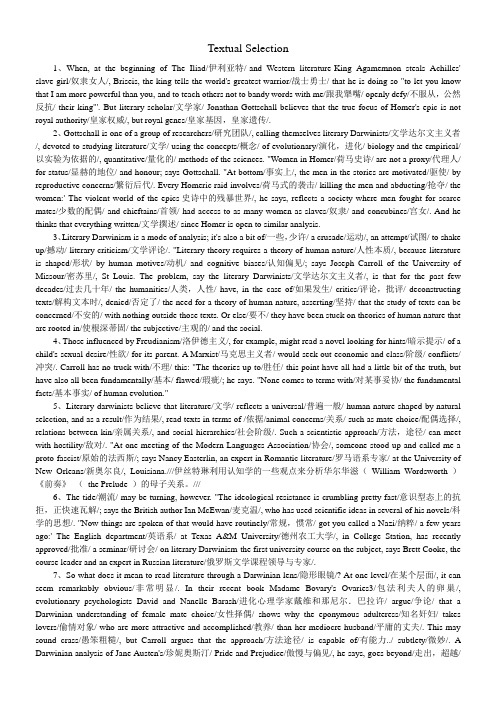
Textual Selection1、When, at the beginning of The Iliad/伊利亚特/-and Western literature-King Agamemnon steals Achilles' slave-girl/奴隶女人/, Briseis, the king tells the world's greatest warrior/战士勇士/ that he is doing so "to let you know that I am more powerful than you, and to teach others not to bandy words with me/跟我犟嘴/ openly defy/不服从,公然反抗/ their king"'. But literary scholar/文学家/ Jonathan Gottschall believes that the true focus of Homer's epic is not royal authority/皇家权威/, but royal genes/皇家基因,皇家遗传/.2、Gottschall is one of a group of researchers/研究团队/, calling themselves literary Darwinists/文学达尔文主义者/, devoted to studying literature/文学/ using the concepts/概念/ of evolutionary/演化,进化/ biology and the empirical/以实验为依据的/, quantitative/量化的/ methods of the sciences. "Women in Homer/荷马史诗/ are not a proxy/代理人/ for status/显赫的地位/ and honour; says Gottschall. "At bottom/事实上/, the men in the stories are motivated/驱使/ by reproductive concerns/繁衍后代/. Every Homeric raid involves/荷马式的袭击/ killing the men and abducting/抢夺/ the women:' The violent world of the epics史诗中的残暴世界/, he says, reflects a society where men fought for scarce mates/少数的配偶/ and chieftains/首领/ had access to as many women as slaves/奴隶/ and concubines/宫女/. And he thinks that everything written/文学撰述/ since Homer is open to similar analysis.3、Literary Darwinism is a mode of analysis; it's also a bit of/一些,少许/ a crusade/运动/, an attempt/试图/ to shake up/撼动/ literary criticism/文学评论/. "Literary theory requires a theory of human nature/人性本质/, because literature is shaped/形状/ by human motives/动机/ and cognitive biases/认知偏见/; says Joseph Carroll of the University of Missour/密苏里/, St Louis. The problem, say the literary Darwinists/文学达尔文主义者/, is that for the past few decades/过去几十年/ the humanities/人类,人性/ have, in the case of/如果发生/ critics/评论,批评/ deconstructing texts/解构文本时/, denied/否定了/ the need for a theory of human nature, asserting/坚持/ that the study of texts can be concerned/不安的/ with nothing outside those texts. Or else/要不/ they have been stuck on theories of human nature that are rooted in/使根深蒂固/ the subjective/主观的/ and the social.4、Those influenced by Freudianism/洛伊德主义/, for example, might read a novel looking for hints/暗示提示/ of a child's sexual desire/性欲/ for its parent. A Marxist/马克思主义者/ would seek out economic and class/阶级/ conflicts/冲突/. Carroll has no truck with/不理/ this: "The theories up to/胜任/ this point have all had a little bit of the truth, but have also all been fundamentally/基本/ flawed/瑕疵/; he says. "None comes to terms with/对某事妥协/ the fundamental facts/基本事实/ of human evolution."5、Literary darwinists believe that literature/文学/ reflects a universal/普遍一般/ human nature shaped by natural selection, and as a result/作为结果/, read texts in terms of /依据/animal concerns/关系/ such as mate choice/配偶选择/, relations between kin/亲属关系/, and social hierarchies/社会阶级/. Such a scientistic approach/方法,途径/ can meet with hostility/敌对/. "At one meeting of the Modern Languages Association/协会/, someone stood up and called me a proto-fascist/原始的法西斯/; says Nancy Easterlin, an expert in Romantic literature/罗马语系专家/ at the University of New Orleans/新奥尔良/, Louisiana.///伊丝特琳利用认知学的一些观点来分析华尔华滋(William Wordsworth )《前奏》(the Prelude )的母子关系。
高中英语 Unit 4《Body Language》教案(7) 新人教版必修4

Unit 4 Body language 教案示例(1)教学目的和要求(Teaching aims and demands)教学建议(Suggested teaching notes)一、教学内容分析本单元的中心话题是“身势语”。
身势语是非语言交际手段中非常重要的一个方面,它通过无声的语言表达一个人的内心自世界。
与有声语言一样身势语也是文化的载体,在跨文化交际中起着举足轻重的作用。
了解身势语的不同文化涵义并正确地加以运用,经常会在交际场合起到意想不到的好效果。
教师在教授本单元时,可以提醒学生注意自己和他人在日常交际中的体态、姿势、面目表情等等,正确地理解和运用身势语,以达到良好的交际效果。
“热身”(Warming Up)部分以列表对比的形式引导学生了解有声语言与身势语之间的对应关系,并建议学生把这些动作表演出来,既有趣味性,又有体验实践性。
“读前”(Pre-reading)部分首先引导学生对语言的目的、身势语的含义进行思考,随后引导学生联系自己日常生活的实际,想一想How can you tell if someone is sad even if they do not speak?最后一个问题,启发学生说出身势语在跨文化交际中的作用。
“阅读”(Reading)部分,以机场迎接客人为场景,讲述了几个不同国家的来宾由于文化背景的差异,初次见面时互相问候的方式迥然相异,而造成的一些小误会。
形象地表明了身势语与文化背景的密切关系,以及身势语在人们日常交际中的重要作用。
这部分的写作方式颇有特色,可以让学生在阅读过程中,很自然地以“你”的身份去观察、倾听在机场发生的一切。
“理解”(Comprehending)部分的前五个小题旨在检查学生对阅读篇章细节的理解,第六、七小题旨在引导学生对身势语的文化差异、身势语的意义进行积极的思考,第八小题则要求学生能够运用细节推断出主人公的性别。
“语言学习”(Learning about Language)部分要求学生根据英文释义填写本单元重点词汇,然后用课文中的词语填空和运用派生法变换词性。
Unit One --Unit Four 知识点总结归纳

Section A:1.提问生日:你的生日是什么时候?When is your birthday?=Wha t is your date of birth ?例:你妈妈的生日是什么时候?When is your mother’s birthday?=What is your mother’s date of birth ?2.日期的表达:月、日、年(日读序数词)(序数词前通常加the)1月1日:January the first 12月12日:December the twelfth3.提问日期:What’s the date today? 今天几号?4.提问岁数:你多大了?我14岁。
--How old are you? --I’m fourteen (years old).=--What’s your age? –My age is fourteen.(--It’s fourteen.)例:你爸爸多少岁?--How old is your father?—He’s forty(years old).--What’s your father’s age?—His age is forty.5.--Happy Birthday! –Thank you.Section B:1.speech contest 演讲比赛English speech contest 英语演讲比赛Chinese speech contest 语文演讲比赛English contest 英语竞赛Chinese contest 语文竞赛2.basketball game 篮球比赛volleyball game 排球比赛3.birthday party 生日聚会4.school trip 学校旅行5.School Day 学校庆祝日6.have an art festival 举行艺术节have a music festival 举行音乐节have an English party 举行英语晚会have a School Day 举行校庆日7.at your school 在你们学校8.--Do you have …? –Yes, we do./ No, we don't. Section A:1.提问生日:你的生日是什么时候?When is your birthday?=Wha t is your date of birthday?例:你妈妈的生日是什么时候?When is your mother’s birthday?=When is your mother’s date of birthday?2.日期的表达:月、日、年(日读序数词)(序数词前通常加the)1月1日:January the first 12月12日:December the twelfth3.提问日期:What’s the date today? 今天几号?4.提问岁数:你多大了?我14岁。
大一英语Unit four

4.Feature: (n) 1) distinctive characteristic; aspect 特征 特色 e.g One feature of her writing is vivid.(她写作的一个 特点就是生动) 2) features : face viewed as a whole 面容 e.g She is of good features.(她面容娇好) 3) ~ on sth: special or prominent article or programme 特写 e.g This magazine will be running a special feature on education next week. (这一杂志下周要发表一篇关于 教育的专题文章) 4)full-length film as part of a cinema programme 故事 片 e.g Let’s see the main feature following the cartoon. (让我们看动画片后的故事片)
与…没有关系 注定;必然要 弄明白 承担责任 想出(计划、回 答); 做出(反应);产 生
1.have little relation to: have nothing to do with e.g They have little business relations with this company. bear no relation to 和….完全不相称,与毫无关系 be out of all relation to和…完全不相称,与…毫无 关系 have relation to 有关,和….有关系 in/with relation to 关于,就….而论 make relation to提及,读到
新教材高考英语一轮Unit4BodyLanguage选择性必修第一册
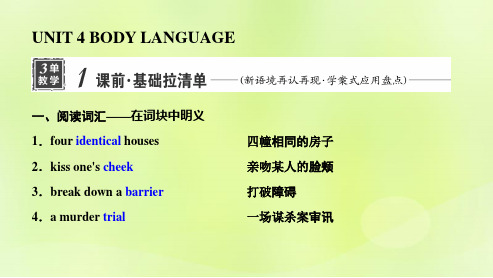
从__…___…__到__…__…__变__化_ _相__比__之__下__ _往__下__看__ _比__较__而__言__ _打__破__ _换__句__话__说__
7.It is impossible to get everybody together at the same time.
_同__时__
2.
Of course, not everyone who looks up is paying attention in 教材
class.(部分否定) 原句
当然,不是所有抬着头的学生都是在认真听课。
As there are so many kinds of folk art works,I can't introduce 写作 every kind in such a short time. 亮句 由于民间艺术作品种类繁多,我不可能在这么短的时间内介绍
5.(2021年1月新高考8省联考卷)What actually happens is that the magician,
employing quick hand movements ... hides one ball.
(vt._使__用__)
拓展:employment n.雇用;工作;就业
6.French differs from English in this respect.
UNIT 4 BODY LANGUAGE
一、阅读词汇——在词块中明义 1.four identical houses 2.kiss one's cheek 3.break down a barrier 4.a murder trial
四幢相同的房子 亲吻某人的脸颊 打破障碍 一场谋杀案审讯
2011剑桥下册Unit Four基本句型
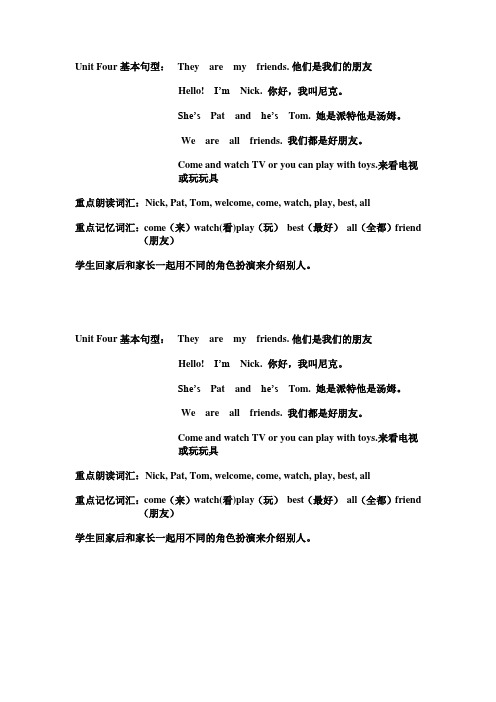
Unit Four基本句型:They are my friends. 他们是我们的朋友
Hello! I’m Nick. 你好,我叫尼克。
She’s Pat and he’s Tom. 她是派特他是汤姆。
We are all friends. 我们都是好朋友。
Come and watch TV or you can play with toys.来看电视
或玩玩具
重点朗读词汇:Nick, Pat, Tom, welcome, come, watch, play, best, all
重点记忆词汇:come(来)watch(看)play(玩)best(最好)all(全都)friend (朋友)
学生回家后和家长一起用不同的角色扮演来介绍别人。
Unit Four基本句型:They are my friends. 他们是我们的朋友
Hello! I’m Nick. 你好,我叫尼克。
She’s Pat and he’s Tom. 她是派特他是汤姆。
We are all friends. 我们都是好朋友。
Come and watch TV or you can play with toys.来看电视
或玩玩具
重点朗读词汇:Nick, Pat, Tom, welcome, come, watch, play, best, all
重点记忆词汇:come(来)watch(看)play(玩)best(最好)all(全都)friend (朋友)
学生回家后和家长一起用不同的角色扮演来介绍别人。
Unit Four 课文翻译
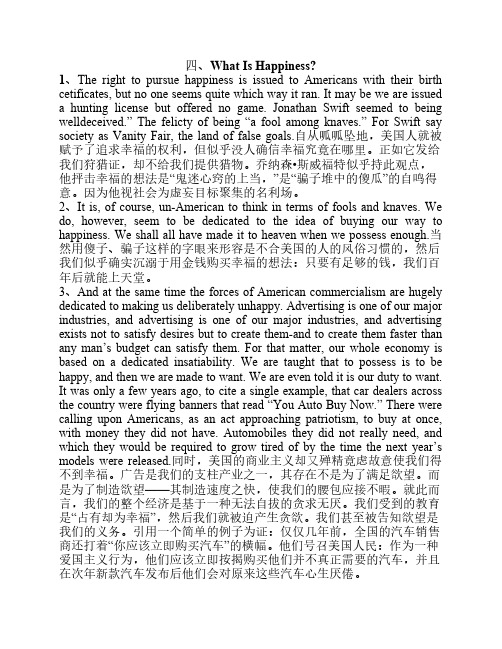
四、What Is Happiness?1、The right to pursue happiness is issued to Americans with their birth cetificates, but no one seems quite which way it ran. It may be we are issued a hunting license but offered no game. Jonathan Swift seemed to being welldeceived.” The felicty of being “a fool among knaves.” For Swift say society as Vanity Fair, the land of false goals.自从呱呱坠地,美国人就被赋予了追求幸福的权利,但似乎没人确信幸福究竟在哪里。
正如它发给我们狩猎证,却不给我们提供猎物。
乔纳森•斯威福特似乎持此观点,他抨击幸福的想法是“鬼迷心窍的上当,”是“骗子堆中的傻瓜”的自鸣得意。
因为他视社会为虚妄目标聚集的名利场。
2、It is, of course, un-American to think in terms of fools and knaves. We do, however, seem to be dedicated to the idea of buying our way to happiness. We shall all have made it to heaven when we possess enough.当然用傻子、骗子这样的字眼来形容是不合美国的人的风俗习惯的,然后我们似乎确实沉溺于用金钱购买幸福的想法:只要有足够的钱,我们百年后就能上天堂。
3、And at the same time the forces of American commercialism are hugely dedicated to making us deliberately unhappy. Advertising is one of our major industries, and advertising is one of our major industries, and advertising exists not to satisfy desires but to create them-and to create them faster than any man’s budget can satisfy them. For that matter, our whole economy is based on a dedicated insatiability. We are taught that to possess is to be happy, and then we are made to want. We are even told it is our duty to want. It was only a few years ago, to cite a single example, that car dealers across the country were flying banners that read “You Auto Buy Now.” There were calling upon Americans, as an act approaching patriotism, to buy at once, with money they did not have. Automobiles they did not really need, and which they would be required to grow tired of by the time the next year’s models were released.同时,美国的商业主义却又殚精竟虑故意使我们得不到幸福。
Unit Four 单词

Unit Four1. Snapshot: Favourite Ethnic Dishesethnic [ ♏⏹♓] adj. 人种的*garlic [ ♑●♓] n. : a plant like a small onion, used in cooking to give a strong taste 大蒜,蒜头spice [♦☐♋♓♦] n. 香料,调味品crispy [ ❒♓♦☐♓] adj. 爽口的,脆的*shrimp[☞❒♓❍☐] n.小虾raw [r ] adj.生的marinate [ ❍✌❒♓⏹♏♓♦] vt.浸泡lime [●♋♓❍] juice n.酸橙汁chilli[ ♦☞♓●♓] pepper n.辣椒2. Conversationsnail [snei●] n. : a small soft creature that moves very slowly and has a hard shell on its back 蜗牛*appetizer [ ✌☐♓♦♋♓☜]n. : a small dish of food served at the beginning of a meal 开胃菜fried brains n. : the brain of an animal, used as food yuck [ ✈] int. : used to show that you think something is very unpleasantcare for vt. 关心,计较*rare [r☪☯]adj. : meat that is rare has only been cooked for a short time and is still red 半熟的*menu [ ❍♏⏹◆] n.: a list of dishes served at a meal or that can be ordered in a restaurant 菜单*ingredient [in ♑❒♓♎♓☯⏹♦] n. : a component of a mixture, compound, etc, esp in cooking (做菜的)成分3. Pronunciation – Reduced forms*skip [skip] v. : to miss deliberately 遗漏,跳过4. Grammar Focusdefinite [ definit] adj. : known for certain;sure 确定的*picnic [ piknik] n. : any informal meal eaten outside 野餐5. Listeningfork [f k]n. : a tool you use for picking up and eating food, with a handle and three or four points 餐叉tough [t✈f] adj. difficult to cut or eat 硬的my treat : used to tell someone that you will pay for something such as a meal for them 我请客。
Unit Four 课文翻译

What can you do ?
课文翻译
Unit Four
What can you do ?
什么 会 你 做
36页上
我们将举办一场英文派对
下周二
太好啦!
你可以做些什么呢?
为了这个派对
我可以弹琵琶。 好极了 !
36页下
我会跳舞
我可以唱歌。
37页
李老师
你会打乒乓球吗?
一点
让我们一起打吧 对不起。我有一节英文课 在三点钟
请发给 我一封 电子邮件 邮 箱 地 址 为 :
43页下
44页上
play ping-pong
44页中
piano erhu ping-pong ? basketball ?
45页
故事 时间
我饿了 蛇
亲爱的蛇啊,请等一分钟吧 老鼠
我可以为你表演一些东西的 我可以吃了它 这边来了一些美食
45页中
我不会。
没问题。 我可以帮你。
41页下
烹饪
唱英文歌曲
你会做这个吗? 讲英语 表演一些功夫 唱生日歌
制作一个木偶/机器人
你会烹饪吗? 是的,我会。
42页上
游泳 讲英语
烹饪
让我们讲英语吧
你会游泳吗?
是的,我会。 我也会表演一些功夫。
42页下
speak English and ChiБайду номын сангаасese sing English songs
dance swim cook play ping-pong 我会讲英语和汉语。
跳舞
do any kung fu play the pipa
唱英文歌曲
做饭菜
2020高考英语一轮复习Unit4Bodylanguage练习含解析新人教版必修44
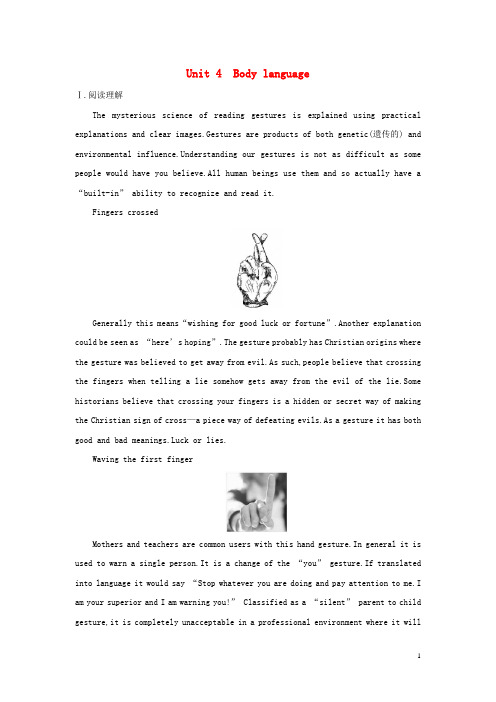
Unit 4 Body languageⅠ.阅读理解The mysterious science of reading gestures is explained using practical explanations and clear images.Gestures are products of both genetic(遗传的) and environmental influence.Understanding our gestures is not as difficult as some people would have you believe.All human beings use them and so actually have a “built-in” ability to recognize and read it.Fingers crossedGenerally this means“wishing for good luck or fortune”.Another explanation could be seen as “here’s hoping”.The gesture probably has Christian origins where the gesture was believed to get away from evil.As such,people believe that crossing the fingers when telling a lie somehow gets away from the evil of the lie.Some historians believe that crossing your fingers is a hidden or secret way of making the Christian sign of cross—a piece way of defeating evils.As a gesture it has both good and bad meanings.Luck or lies.Waving the first fingerMothers and teachers are common users with this hand gesture.In general it is used to warn a single person.It is a change of the “you” gesture.If translated into language it would say “Stop whatever you are doing and pay attention to me.I am your superior and I am warning you!” Classified as a “silent” parent to child gesture,it is completely unacceptable in a professional environment where it willbe interpreted (诠释) as both rude and domineering(盛气凌人的).Some psychologists believe that it has a meaning of the whip.1.What can we infer from the first paragraph?A.Reading gestures is a secret.B.Gestures are formed in daily life.C.Some people make reading gestures difficult on purpose.D.It is hard to explain gestures by images.2.What does a Christian’s crossing his fingers mean?A.Showing he isn’t lucky.B.Wishing to succeed.C.Getting rid of the evil of the lie.D.Crossing the street.3.What is the purpose of your mum’s waving her first finger?A.To wish for good luck.B.To stop you.C.To praise you.D.To help you.4.Why isn’t waving the finger used in a formal occasion?A.Because it is rude.B.Because it is friendly.C.Because it is surprising.D.Because it is helpful.语篇解读:本文是说明文,主要介绍了两种手势语。
大学英语精读第三册--第三版--课件-unit--four

2. What in Sarah’s second e-mail caught the author’s attention? KEY A) In the email Sarah asked the author for a job.
Before Reading
Global Reading Detailed Reading
After Reading
Multiple Choice
Directions: Choose the best answers.
1. What was Sarah’s dream? KEY A) To be a baseball player.
所以这里是一个身体残疾的妇女她对道奇队的报道之广泛不亚于美国任何一个记者可她却在为一个几乎不为人知的网站写作网站的beforereadingglobalreadingdetailedreadingafterreadingokaysoibelievedher
大学英语精读第三册--第三 版--课件-unit--four
There are organized baseball teams for every age group from 6-yearolds to adults. The teams that attract the most interest are those of the two major leagues: the American League and the National League. These teams are made up of men who rank as the world’s best players. Every year, about 50 million people flock to ballparks to watch major league baseball games. Many more millions watch games on television, listen to them on radio, read about them in newspapers, and discuss them with their friends.
人教新版高中英语选择性必修一Unit 4 Body Language---reading 教学设计
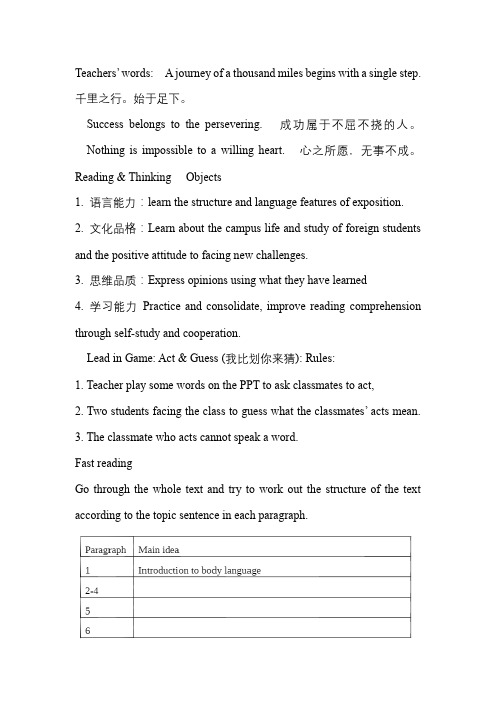
Teachers’ words: A journey of a thousand miles begins with a single step.千里之行。
始于足下。
Success belongs to the persevering. 成功属于不屈不挠的人。
Nothing is impossible to a willing heart. 心之所愿,无事不成。
Reading & Thinking Objects1. 语言能力:learn the structure and language features of exposition.2. 文化品格:Learn about the campus life and study of foreign students and the positive attitude to facing new challenges.3. 思维品质:Express opinions using what they have learned4. 学习能力Practice and consolidate, improve reading comprehension through self-study and cooperation.Lead in Game: Act & Guess (我比划你来猜): Rules:1. Teacher play some words on the PPT to ask classmates to act,2. Two students facing the class to guess what the classmates’ acts mean.3. The classmate who acts cannot speak a word.Fast readingGo through the whole text and try to work out the structure of the text according to the topic sentence in each paragraph.Careful reading & DiscussionTask 1: choose the best answers by yourself.1.What’s the function of the last sentence in Paragraph 1?A. Introduce the background of language.B. Showing words are more important than body language.C. Introduce the topic of this passageD. Making comparison between words and body language. 2.The purpose of the second paragraph is?A. Tell us how important body language is.B. To show an identical gesture may have different meanings in different cultures.C. To stop men and women making eye contact while talking.D. To remind us to look down while talking to an older person to show respect.3.The gesture “ok” means _______ in France?A. MoneyB. RudenessC. ZeroD. Favour.4.Which statement does the author possibly agree with?A. Never too old to learnB. Four eyes see more than two.C. Every country has its own customsD. When in Rome, do as Romans do.Task 2: Fill the blanksTask 3: answer the following questions by yourself and then discuss with your partners.1、Go over the topic sentences in Para 2-5 and identify how each paragraph is developed. Discuss with your partner and draw a mind-map.2、From the last paragraph, we know that smiling has different uses. Can you think of some other uses of smiling?(try to write more than 2 sentences)1)A smile can...2)We can use a smile to3)Sb suggest smiling at/ sb suggest (that) smiling4)There is nothing better than seeing the smiling face of ...when/if we are.. Summary Besides words, body language can also give us informationabout feelings.However, it varies ___1___ culture to culture. For example, making eye contacttogether with the gesture for “ok”, “yes” and “no” ___2___(differ) around theworld. For example, in many Middle Eastern countries, men and women are not___3___(social) permitted to make eye contact. In Japan, it may show respect to look down when speaking with the older people. There are also differences in how we touch each other, how close we stand to someone we ___4___(talk) to and how we act when we meet or part. In countries like France and Russia, people may kiss their friends on ___5___cheek when they meet while in other countries of the world people approve of ___6___(shake) hands, bowing or nodding. Of course, some gestures have the same meaning everywhere. For example, placing hands together and resting them on the side of our head with our eyes closed means “sleep”. If we are full after a meal, we can move our hand in___7___(circle) over our stomach. On the other hand, some body language has many different uses. Perhaps the best example is smiling, ___8___ can help us get through difficult situations, find friends and break down barriers. You can also make ___9___(you) feel happier and stronger by smiling. If you feel down, there is nothing___10___(good) than seeing the smile of your good friend. Post-readingRole Play: 学生四人一组,一人扮演中国学生,另三人分别扮演来自日本、法国和中东的国际交流生。
现代大学英语精读4 Unit Four

8. In one respect/ in some respects: in one way/ some ways 在某个/些方面
eg: In many respects the new version is not as good as the old one.
Mum is very stubborn, and Kim takes after her in that respect.
Introduction: The author’s purpose of spending a night in Central Park (para. 1) the first couple of hours
II. His experiences in the Park during
(paras. 2—6)
During an eclipse, the moon blocks our view of the sun.
We have a good/bad/wonderful view of the mountains from our balcony.
The visitors gradually disappeared/vanished from view.
The Delacorte Theater is a 1,800-seat open-air theater located in Central Park that serves as home to free summertime performances which, during the June, July and August, include at least one Shakespeare production. The summertime performances are one of the New York City’s most beloved cultural events.
高一春05UnitFour不定式与动名词
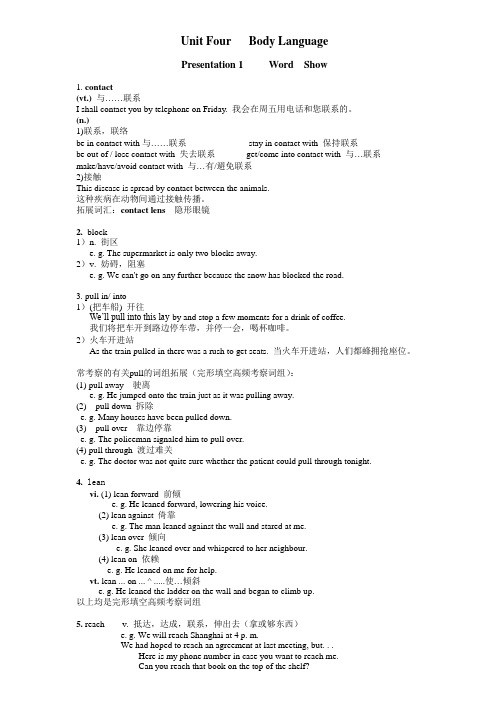
Unit Four Body LanguagePresentation 1 Word Show1. contact(vt.) 与……联系I shall contact you by telephone on Friday. 我会在周五用电话和您联系的。
(n.)1)联系,联络be in contact with与……联系stay in contact with 保持联系be out of / lose contact with 失去联系get/come into contact with 与…联系make/have/avoid contact with 与…有/避免联系2)接触This disease is spread by contact between the animals.这种疾病在动物间通过接触传播。
拓展词汇:contact lens 隐形眼镜2.block1)n. 街区e. g. The supermarket is only two blocks away.2)v. 妨碍,阻塞e. g. We can't go on any further because the snow has blocked the road.3. pull in/ into1)(把车船) 开往We’ll pull into this lay-by and stop a few moments for a drink of coffee.我们将把车开到路边停车带,并停一会,喝杯咖啡。
2)火车开进站As the train pulled in there was a rush to get seats. 当火车开进站,人们都蜂拥抢座位。
常考察的有关pull的词组拓展(完形填空高频考察词组):(1) pull away 驶离e. g. He jumped onto the train just as it was pulling away.(2) pull down 拆除e. g. Many houses have been pulled down.(3) pull over 靠边停靠e. g. The policeman signaled him to pull over.(4) pull through 渡过难关e. g. The doctor was not quite sure whether the patient could pull through tonight.4. leanvi. (1) lean forward 前倾e. g. He leaned forward, lowering his voice.(2) lean against 倚靠e. g. The man leaned against the wall and stared at me.(3) lean over 倾向e. g. She leaned over and whispered to her neighbour.(4) lean on 依赖e. g. He leaned on me for help.vt. lean ... on ... ^ .....使…倾斜e. g. He leaned the ladder on the wall and began to climb up.以上均是完形填空高频考察词组5. reach v. 抵达,达成,联系,伸出去(拿或够东西)e. g. We will reach Shanghai at 4 p. m.We had hoped to reach an agreement at last meeting, but. . .Here is my phone number in case you want to reach me.Can you reach that book on the top of the shelf?常用词组:1)reach for 伸手去拿e. g. The little boy reached for the apple on the shelf.2)reach out 伸出e. g. I reached out my hand to touch the deer on the head.6. back v.(使)后退;(使推出),引证,证明e. g. As he backed away, Leonardo checked him.He backed his car up ten feet and then make the turn.At the meeting John backed his argument with facts.municate v.(1) communicate with 沟通e. g. The worldwide system enables us to communicate instantly with anyone inany part of the world by using computers linked to telephone networks.(2) communicate. .. to 传达e. g. When the failure of the treaty was communicated to the White House,Secretary of State said the President would have no comment to make tonight.词形变化:communicative adj. 健谈的,通讯的communication n. 传达,信息,交通,通讯8.signal (l)n.信号e. g. Even an express train can be held up by signals.(2)v. 给出信号e. g. The policeman signaled the driver to make a left turn.9. arouse (vt.)1)叫醒We aroused him from his deep sleep. 我们把他从熟睡中叫醒。
- 1、下载文档前请自行甄别文档内容的完整性,平台不提供额外的编辑、内容补充、找答案等附加服务。
- 2、"仅部分预览"的文档,不可在线预览部分如存在完整性等问题,可反馈申请退款(可完整预览的文档不适用该条件!)。
- 3、如文档侵犯您的权益,请联系客服反馈,我们会尽快为您处理(人工客服工作时间:9:00-18:30)。
Unit Four Body
1. 教学目标及基本要求:
Objectives:
1) CONVERSATION Can engage in extended conversation on most general topics in a clearly participatory fashion, even in a noisy environment.
2) SOCIOLINGUISTIC APPROPRIATENESS
Can use language flexibly and effectively for social purposes, including emotional, allusive and joking usage.
3) OVERALL LISTENING COMPREHENSION
Can recognize a wide range of idiomatic expressions and colloquialisms, appreciating register shifts
4) OVERALL READING COMPREHENSION
Can understand in detail lengthy, complex texts, whether or not they relate to his/her own area of specialty, provided he/she can reread difficult sections.
5) UNDERSTANDING CONVERSATION BETWEEN NATIVE SPEAKERS
Can keep up with an animated conversation between native speakers.
6) READING FOR INFORMATION AND ARGUMENT
Can understand in detail a wide range of lengthy, complex texts likely to be encountered in social, professional or academic life, identifying finer points of detail including attitudes and implied as well as stated opinions.
7) READING FOR ORIENTA TION Can quickly identify the content and relevance of news items, articles and reports on a wide range of professional topics, deciding whether closer study is worthwhile.
8) CORRESPONDENCE Can express him/herself with clarity and precision in personal correspondence, using language flexibly and effectively, including emotional, allusive and joking usage.
9) GRAMMA TICAL ACCURACY Good grammatical control; occasional ‘slips’ or non-systematic errors and minor flaws in sentence structure may still occur, but they are rare and can often be corrected in retrospect.
10)PHONOLOGICAL CONTROL Can vary intonation and place sentence stress correctly in order to express finer shades of meaning.
11) VOCABULARY RANGE Has a good command of a broad lexical repertoire allowing gaps to be readily overcome with circumlocutions; little obvious searching for expressions or avoidance strategies. Good command of idiomatic expressions and colloquialisms.
2. 教学重点及难点:
Important language points in the text:
Body Language
Idioms:
1) Follow a discussion without participating, e.g. on TV
2) Recognize and understand the vocabulary associated with different types of text, using appropriate strategies to work out meaning
3) Follow a discussion without participating, e.g. on TV
4) Describe and compare
5) Recognize and understand the vocabulary associated with different types of text, using appropriate strategies to work out meaning
6) Describe and compare
3. 教学步骤:
Teaching procedures:
Step One:
Shape your body!
Reading & listening
1) Describe and compare
2) Use skimming, scanning and detailed reading in different ways for different purposes
3) Listen to an explanation or narrative
4) Use skimming, scanning and detailed reading in different ways for different purposes
5) Express views and opinions
Step Two:
Reading
1 )Use skimming, scanning and detailed reading in different ways for different purposes
2) Recognize and understand the vocabulary associated with different types of text, using appropriate strategies to work out meaning
Step Three:
Phrasal verbs
1) Recognize and understand an increasing range of vocabulary, applying knowledge of word structure, related words, word roots, derivations and borrowings
2) Use sentence grammar accurately to achieve purpose
3) Recognize and understand an increasing range of vocabulary, applying knowledge of word structure, related words, word roots, derivations and borrowings
4.课外作业:
Assignment:
1.Check how your own dictionary shows you the difference between different types of phrasal verbs
2.Write five true sentences about yourself using phrasal verbs from 1 and 4. (page.40-41)。
